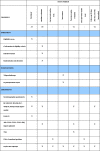Brief internet-delivered cognitive-behavioural intervention for children and adolescents with symptoms of anxiety and depression during the COVID-19 pandemic: a randomised controlled trial protocol
- PMID: 36273162
- PMCID: PMC9588201
- DOI: 10.1186/s13063-022-06836-2
Brief internet-delivered cognitive-behavioural intervention for children and adolescents with symptoms of anxiety and depression during the COVID-19 pandemic: a randomised controlled trial protocol
Abstract
Background: The COVID-19 pandemic has had major impacts in many different spheres, including mental health. Children and adolescents are especially vulnerable because their central nervous system is still in development and they have fewer coping resources than do adults. Increases in the prevalence of depressive and anxiety symptomatology have been reported worldwide. However, access to mental health care is limited, especially for the paediatric population and in low- and middle-income countries. Therefore, we developed a brief internet-delivered cognitive-behavioural intervention for children and adolescents with symptoms of anxiety and depression. The aim of this proposed study is to test the efficacy of the intervention.
Methods: We will conduct a two-arm, parallel randomised controlled trial involving children and adolescents (8-11 and 12-17 years of age, respectively) with symptoms of anxiety, depression or both, according to the 25-item Revised Child Anxiety and Depression Scale (t-score > 70). A total of 280 participants will be randomised to the intervention group or the active control group, in a 1:1 ratio. Those in the intervention group will receive five weekly sessions of cognitive-behavioural therapy via teleconference. The sessions will focus on stress responses, family communication, diaphragmatic breathing, emotions, anger management, behavioural activation and cognitive restructuring. Participants in both groups will have access to 15 videos covering the same topics. Participant-guardian pairs will be expected to attend the sessions (intervention group), watch the videos (control group) or both (intervention group only). A blinded assessor will collect data on symptoms of anxiety, depression and irritability, at baseline, at the end of the intervention and 30 days thereafter. Adolescents with access to a smartphone will also be invited to participate in an ecological momentary assessment of emotional problems in the week before and the week after the intervention, as well as in passive data collection from existing smartphone sensors throughout the study.
Discussion: Internet-delivered interventions play a major role in increasing access to mental health care. A brief, manualised, internet-delivered intervention might help children and adolescents with anxiety or depressive symptomatology, even outside the context of the COVID-19 pandemic.
Trial registration: ClinicalTrials.gov NCT05139433. Registered prospectively in November 2021. Minor amendments made in July 2022.
Keywords: Anxiety; COVID-19 pandemic; Children and adolescents; Cognitive-behavioural therapy; Depression; Irritability; Stress; Telemedicine.
© 2022. The Author(s).
Conflict of interest statement
GVP has served as a consultant/speaker to Abbott, Ache, Medice, Novo Nordisk and Takeda; he has received royalties from Editora Manole. The other authors declare that they have no competing interests.
Figures

Similar articles
-
Internet-based cognitive therapy for women with antenatal depressive symptoms during the COVID-19 pandemic: protocol for a multi-center randomized controlled trial across China.Trials. 2022 Sep 21;23(1):797. doi: 10.1186/s13063-022-06728-5. Trials. 2022. PMID: 36131289 Free PMC article.
-
A smartphone-assisted brief online cognitive-behavioral intervention for pregnant women with depression: a study protocol of a randomized controlled trial.Trials. 2021 Mar 23;22(1):227. doi: 10.1186/s13063-021-05179-8. Trials. 2021. PMID: 33757591 Free PMC article.
-
Effectiveness and cost-effectiveness of guided Internet- and mobile-based CBT for adolescents and young adults with chronic somatic conditions and comorbid depression and anxiety symptoms (youthCOACHCD): study protocol for a multicentre randomized controlled trial.Trials. 2020 Mar 12;21(1):253. doi: 10.1186/s13063-019-4041-9. Trials. 2020. PMID: 32164723 Free PMC article.
-
Cognitive behavioural therapy for tinnitus.Cochrane Database Syst Rev. 2020 Jan 8;1(1):CD012614. doi: 10.1002/14651858.CD012614.pub2. Cochrane Database Syst Rev. 2020. PMID: 31912887 Free PMC article.
-
Psychological therapies for anxiety and depression in children and adolescents with long-term physical conditions.Cochrane Database Syst Rev. 2018 Dec 22;12(12):CD012488. doi: 10.1002/14651858.CD012488.pub2. Cochrane Database Syst Rev. 2018. PMID: 30578633 Free PMC article.
Cited by
-
Daily experiences and adolescent affective wellbeing during the COVID-19 pandemic: The CHESS model.Curr Opin Psychol. 2023 Oct;53:101654. doi: 10.1016/j.copsyc.2023.101654. Epub 2023 Jun 30. Curr Opin Psychol. 2023. PMID: 37517164 Free PMC article. Review.
-
The Effect of Diaphragmatic Breathing as a Complementary Therapeutic Strategy in Stress of Children and Teenagers 6-18 Years Old.Children (Basel). 2025 Jan 5;12(1):59. doi: 10.3390/children12010059. Children (Basel). 2025. PMID: 39857890 Free PMC article. Review.
References
-
- de Figueiredo CS, Sandre PC, Portugal LCL, Mázala-de-Oliveira T, da Silva CL, Raony Í, et al. COVID-19 pandemic impact on children and adolescents’ mental health: biological, environmental, and social factors. Prog Neuropsychopharmacol Biol Psychiatry. 2021;106:110171. doi: 10.1016/j.pnpbp.2020.110171. - DOI - PMC - PubMed
-
- Loades ME, Chatburn E, Higson-Sweeney N, Reynolds S, Shafran R, Brigden A, et al. Rapid systematic review: the impact of social isolation and loneliness on the mental health of children and adolescents in the context of COVID-19. J Am Acad Child Adolesc Psychiatry. 2020;59(11):1218–1239.e3. doi: 10.1016/j.jaac.2020.05.009. - DOI - PMC - PubMed
Publication types
MeSH terms
Associated data
Grants and funding
LinkOut - more resources
Full Text Sources
Medical

